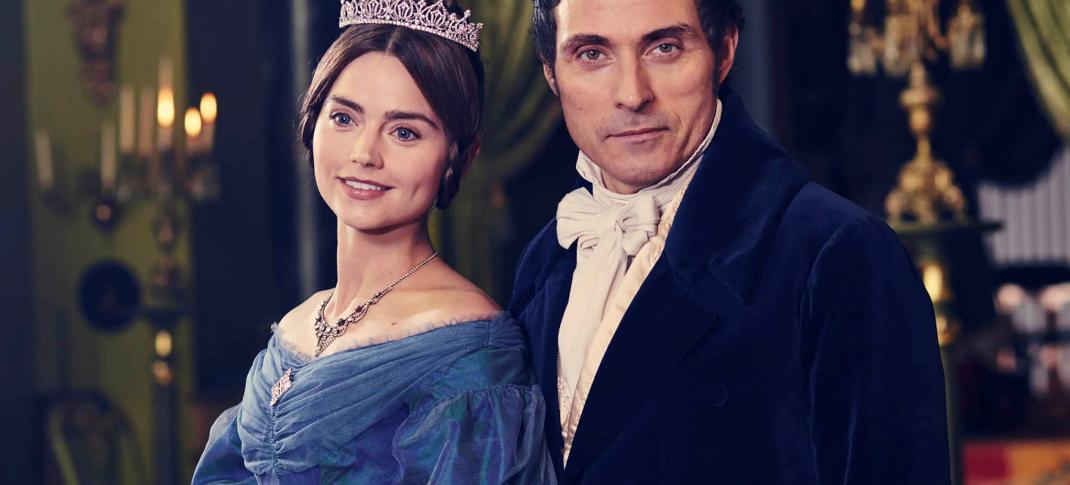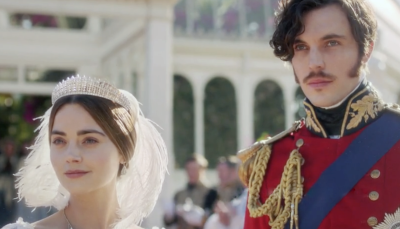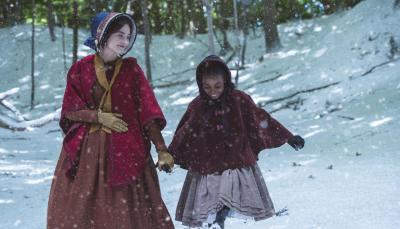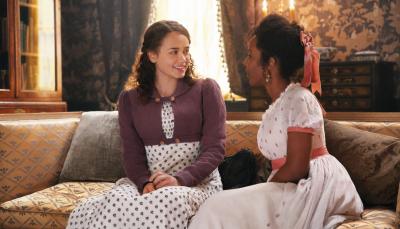Girl Power, Rooks and ‘Victoria’ the Novel: Our Chat with Series Creator Daisy Goodwin

Period drama Victoria ‘s first season is currently airing on PBS’ Masterpiece and it’s pretty much exactly the kind of thing your Sunday night needs. The show has been extremely successful already - it was UK network ITV’s most popular drama last year, and has already been renewed for a second season, with an additional 2017 Christmas special on the way.
Long live the queen, indeed.
Just after the season premiere here in the U.S., we had a chance for a quick chat with series’ creator Daisy Goodwin. Before helming Victoria - and writing all eight hours of its first season – Goodwin studied history at Cambridge University, with a focus on Queen Victoria. She’s also a rather accomplished author and has published several novels, including My Last Duchess, The Fortune Hunter and The American Heiress.
We got the chance to speak with Ms. Goodwin for a few minutes on a variety of topics ranging from Victoria’s feminist leanings to the historical accuracy of the show’s portrayal of Lord Melbourne to her latest book, the novel Victoria that stands alongside the series’ first season.
Read on for a transcript of our conversation, and a few fun insights about the show and the queen it is based on.
(For the record, I’ve cleaned up this Q&A a bit, to remove things like repeated words, dropped phrases and my apparent love for the word “um” when speaking. You’re welcome, folks.)

Lacy: My first question I wanted to ask you was about something you tweeted during the premiere last night. You tweeted “When women don’t do what men want them to do, they’re called hysterical” and I just thought that was a really great quote to begin with. It’s so true and it really made me think about certain aspects of the show a little differently. Even though Victoria’s set in the 1800s, it still somehow feels very timely, concerned with issues of a woman in power and how people do or don’t necessarily trust that. I’d love to know if that kind of thing informed the way that you made the show at all.
Daisy Goodwin: Well it wasn’t a deliberate decision, really. I remember the first interview I did about the show while we were filming last year, and a reporter from the Telegraph had been on set and he’s seen – oh, I don’t know the coronation or something – and he just said, “So, is this a feminist version of Queen Victoria then"? And I just thought, what do you mean by that? I couldn’t understand what made him think that, what was feminist about a show that’s about a queen. But then I realized – that was what was feminist. It was a show about a young woman, at the center of the show, who’s the boss.
And, if you think about it, there aren’t many – there are practically no – TV shows where you have a young girl who is the central character, who is in every scene, on whom the whole thing depends. So, from that point of view, yes, it’s an exploration of a woman in power. And a young woman in power, which everybody finds really transgressive in some strange way. And I think that from my reading of the contemporary sources – newspapers and all that kind of stuff – that there was a kind of [attitude of] “Oh, hurray, how great that we have this young pretty girl as England’s rose” and all that stuff. But then there was at the same time, the moment she stepped out of line, men who were like “Oh, can she do this, is she fit, has she got what it takes, is there something wrong with her?” In other words, in a man they’re asserting their authority, but when a woman does it they’re hysterical. Everybody liked her when she was pretty as a picture and wasn’t doing anything. But the moment she tried to say, “Well, you know what, I don’t want you as my Prime Minister; I want you”, they said she was mad or that she’d been kind of brainwashed by Melbourne. People find it very hard to credit that she might have had any ideas of her own.
So when the uncles, when her wicked uncle the Duke of Cumberland is saying oh there’s maybe something wrong with her wits and Conroy’s saying that – that’s on the show but that was something that was definitely in the air at the time. And I just thought that was interesting – they wouldn’t have said that about a young man. If it had been an 18 year old boy, no one would have said that. If you look at the adjectives that are only applied to women, it gives you a pretty accurate impression of what estimation women are held in society. Men are never called bossy or feisty or shrill or any of those things. Those are adjectives that are only applied to women.

LB: So since the show’s airing here in America now, I’ll ask this because I know it’s something people are talking about and wondering whether it’s true or how true. Victoria and Lord Melbourne’s relationship, let’s talk about it.
DG: Yeah, there’s been a lot of talk about that. All I’m saying is that my depiction of their story is: Yes, it’s heightened, because it’s a drama.
LB: I mean, I definitely ship it, for what it’s worth.
DG: Of course! But here’s the thing: I’ve read her diaries for the first few years of her life, while she’s with Melbourne. And there is no doubt that this is the biggest teenage crush of all time. I mean, literally on every single page he’s mentioned. She’s like “He likes my dress” but “He doesn’t like earrings, he says they’re barbarous” or “we talked about how flogging was a great way of disciplining young boys”. It’s all we did this, he said he’d come for dinner but he didn’t and why isn’t he here.
And these diaries, let’s not forget, were heavily edited by her daughter after her death. So this is only what got through. Obviously, I’ve heightened it, and I’ve compressed it. I’ve brought it to a head. But the evidence is this – he was a famous ladies man, he’d had this disastrous marriage, his child had died the year before he meets Victoria. So he’s lonely. He had this awful thing the year before too, where he’s cited in a divorce court as a “correspondent” – “criminal conversation” it was called.
So he’s a famous ladies man, and he’s lost the only thing he loves, which is his son. And he’s looking for love. He kind of wishes he wasn’t Prime Minister, he’s bored with office and then suddenly this young girl comes into his life and he’s entranced. He sees how foolish she is, and how young and naïve and all of that, but he also finds her irresistible.
There’s a contemporary diarist called Greville, who was the secretary of the privy council, so he saw Victoria and Melbourne together all the time. And in his diary he basically says the Queen is besotted with Lord Melbourne and her feelings for him are clearly sexual – he actually uses that word – if she but knew it. If she but knew it. So, you know, contemporaries, people at the time, absolutely knew that that was what was happening. But now I think that people are slightly more reluctant to believe it. Because we know that Albert’s coming down the pike. But if you look at it from what happened then, everybody – I mean, she was called Mrs. Melbourne in the popular press, so it’s not something I’ve just made up because it’s a good story. It was definitely there. I probably pushed it a bit with the thing about her going to propose to him.
LB: That scene is so amazing though.
DG: It’s such a great scene. He did like rooks. He was very keen on rooks.
LB: Do rooks really mate for life? Is that a real thing?
DG: Yup. So that was a bit of luck. I was googling rooks and I found this out. And I just thought, whoa, that’s a metaphor.
Yes, it’s a drama. I don’t think King Henry V probably made a speech about St. Crispin’s Day on the field of Agincourt. But Shakespeare wrote it. And I’m not saying I’m Shakespeare or anything, but the job of the dramatist is to bring the story to life. And this in my view is the story. If anybody wants to make up their own mind, they can read Victoria’s diaries, which are all online on queenvictoriasjournal.org. 62 million words she wrote in her lifetime. If she’d been alive today, she’d have definitely been on Twitter.

LB: Speaking of writing, I got your new book for Christmas. And I haven’t read it yet, I was waiting until I finished the show. But I’m very excited to read it, so I wanted to make sure to ask you what you would like to tell people as a reason to read the book Victoria in addition to watching the show Victoria.
DG: Oh, I think if you like the show, you’re going to really love the book. I think what the book does – it answers all the questions you’re probably asking yourself when you watch the show. However, it also gives you – I’ve put all my research into the book, so if you want a sense of what Britain was like at that time you get a lot of that in there.
Plus, it’s really just about Victoria. The thing about a TV show is that you have to keep the plot going, but this is very much in her head. So if you want to get really – if you like the characters, it takes you much deeper than the show does. The show is the icing, and this is the cake, maybe. I mean, I love them both. They’re complimentary. In Britain the book came out after the show, and people who loved the show ADORED the book. So I think you won’t be disappointed.
LB: Do you think you’ll release a second novel when the second season of Victoria is out?
DG: I’m writing Season 2 right now, so yeah. It just how much time I’ve got really.

LB: As an American who loves costume drama, and thanks to Downton Abbey I guess for the rise of interest in this genre in America right now, it’s been a really good time to be an Anglophile here. I would like to know – I think Victoria does so many great elements of costume drama all together in one package, so clearly you must have seen quite a bit of them. So, what is your favorite period drama?
DG: Well, I must confess I watched every single episode of Downton Abbey.
LB: So did I! Probably multiple times!
DG: I was compulsive viewer of Downton. I think it started = I thought the first three seasons were terrific, but still I watched every single one.
I loved the recent miniseries of War and Peace that the BBC did. When I was growing up, they did a couple of period dramas, one was Henry VIII and His Six Wives, the other was the The Forthstye Saga and I was completely addicted to that. And I thought Wolf Hall was really terrific.
-------------------
Have to say, this was such a fun conversation to have. Thanks so much to Daisy Goodwin for taking a few minutes to talk with us, and If you haven’t checked out the show or the novel yet, get started. (I’ll let you know what I think about Victoria the book once I’ve read it. We’ve got recaps of the show up already.)




